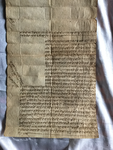A copy of a rukkā from Jaṅga Bahādura exempting subjects in Doce from the obligation to supply an assigned quota of rations (VS 1917)
ID: Tsum_0001_0013
Edited and
translated by Nadine Plachta and Rajendra Shakya
Created: 2017-12-14;
Last modified: 2018-11-27
For the metadata of the document, click here
The accompanying edition, translation/synopsis and/or commentary are available under the terms of the Creative Commons Attribution-ShareAlike 4.0 International License
Abstract
This is a copy of a rukkā of Jaṅga Bahādura exempting subjects in Doce, as a reward for spying on the Tibetan army during the Nepalese–Tibetan War, from having to supply mandatory rations for a period of two years.Diplomatic edition
[1r]
1नकल1श्रीकम्याडिङजनरलभाईजग2त्समसेरजङ्गकुव़रराणा¯¯¯¯¯¯
3२1श्रीजनरलसाहेव
2१1स्वस्तिश्रीमदतिप्रचण्डभुजडण्डेत्यादीश्रीश्रीश्रीमहाराज∙जङ्गवहादुर∙राणाजि∙सिविप्रा
2ईममिनिष्टरय़ान्ड∙कम्यान्डर∙ईन∙चिफकस्यरुक्का¯¯¯ ¯¯¯ ¯¯¯ ¯¯¯ ¯¯¯ ¯¯¯
3स्वस्तिश्रीमद्राजकुमारकुमारात्मज∙श्रीकम्यान्डरईनचिफ
4जनरलकृष्णवहादुरकुव़रराणाकस्येपत्रम्¯¯¯ ¯¯¯ ¯¯¯ ¯¯¯ ¯¯¯ ¯¯¯
5आगे∙डिट्ठागौरिदास∙धमालाके∙यथोचित्∙उप्रान्त∙११सा
6लमा∙भोटसंगलडाञिंहुंदातिमि∙भोटेप्रजाहरुलेआ∙
7फ्नुसाधसिमा∙गौंडागल्फामाहोसिय़ारिराषि∙दुस्म
8न्कोचिव़ाचर्चा∙गर्नु∙तिमिहरुकाचौरिगदहालगि∙
9फौजपल्टन्वस्याकाठाउमादारुव़ावोकिपुर्याउनुति
10मिहरुले११|१२सालमालाग्याकोरसदवोक्नुप्रदैनमा
11फभयोभनि¯¯¯ ¯¯¯ १¯¯¯ ¯¯¯वाटमर्जिहुंदामर्जीवमोजिम्∙पल्
12टन्वस्याकाजगाजगामादारुव़ावोकिपुर्यायौं∙जगाजगा
13मा∙दुस्मन्कोचिव़ाचर्चापनिगर्यौंहिजै∙तिमिहरुले११|१२
14सालमालाग्याकोरसदवोक्नुपर्छभनि∙मर्जिभय़ाकोभय़ा
15रसदपनिवोक्ताहुँ∙आजआहामिदोच्येप्रर्जालाईञांहांवा
16टरसदउठाउनजान्याडिट्ठागौरिदास्धमालाले∙हलपाट्राकोदालेको११सालको
17डेढोर१२सालकोस्मेत्हिसाफ्गरि∙८पाथिका∙दरभावलेदामवुझाउभनि∙हामिला
18ई∙क्षेकथुन्धरपकरगर्नलाग्याहिँउकाडल्लाकोवास्∙षेतिकमाई∙हाम्रोकेहीछैनभो
19टवाटनुन्वोकिल्याई∙उधोवाटआयाकाढाक्र्यालेल्यायाको∙नुन्साटी∙वेपारलेजिवि
20कागरि∙अघिदेषिदरिचलिआयाकोरकम्तिरिरह्याकाप्रजाहुंतिमिहरुलेरसद∙
21वोक्नु∙पर्दैनमाफ्भयो∙भनिमर्जिभयाकैहो∙योरसदमाफिपाउन्याहुंभनि∙अठा
22रसयेषोलामध्ये∙स्यार्कुतांङ्पट्टिकादोचेप्रजाहरुले¯¯¯ ¯¯¯२¯¯¯ ¯¯¯मार्फतअर्जीचढा
23ईविन्तिगर्यारकसोहोभनि¯¯¯ ¯¯¯२¯¯¯ ¯¯¯संग∙सोधनिगर्दा∙केरुंवाटपल्टनिञासिपा
24हिघरघरैपठाई∙चौरि∙गदाहा∙उठाईदारुवावोकाइजगाजगामागौडागल्फाचिव़ाच∙
25र्चा∙गर्नु∙रसदवोकनुपर्दैन∙माफभयोभनिभन्याकोहोभनि¯¯¯ ¯¯¯२¯¯¯ ¯¯¯लेहाम्राहजुरमा
26विन्तीपार्दाजाहेरभयो∙तसर्थ∙अठारसय़षोलामध्ये∙स्यारकुताङ्पट्टिकादोच्याप्र
27जागैह्रलाई∙११|१२सालमालाग्याकोरसद∙माफगरिवक्स्यौंछाडिदेउ∙टंटानग
28रलियाको∙भयापनि∙फिर्तागरिदेऊईतिसम्वत्१९१७सालमितिमार्गवदी३रो
29ज७शुभ्म्¯¯¯ ¯¯¯ ¯¯¯ ¯¯¯ ¯¯¯ ¯¯¯ ¯¯¯ ¯¯¯
Translation
[1r]
Copy
Venerable Commanding General [and] younger brother Jagat Śamśera Jaṅga Kũvara Rāṇā – 2
Venerable General Sāheba – 1
Hail! A rukkā of him who is very mighty, has arms like a staff etc., the thrice venerable great king, GCB Prime Minister and Commander-in-Chief Jaṅga Bahādura Rāṇā
Hail! A letter from Commander-in-Chief General Kṛṣṇa Bahādura Kũvara Rāṇā, the venerable prince born of a prince
Āge: to ḌiṭṭhāGauridāsa Dhamālā
Yathocita uprānta: “During the war against Bhoṭa in the year [19]11 (1855 CE), [Venerable General Sāheba]1 ordered [as follows]:– ‘You, bhoṭa prajās2 , remain alert at your (section of) border, [and] in gaũḍās and galphās3 , and observe the enemy’s movements. Take your yaks and donkeys and deliver firewood to the places where the army battalion is staying. You need not bear [the burden of providing your quota of] rations for the years [19]11 / [19]12. [You have been] exempted.’ Persuant to the order, [we] delivered firewood to many places where the battalion was staying. [We] also observed the movements of the enemy at many places. If back then we had been given the order: ‘You will have to transport [your quota of] rations for the years [19]11 / [19]12’, we would have transported the rations, too.
Now Ḍiṭṭhā Gauridāsa Dhamālā, the officer appointed to obtain rations from here, is threatening to arrest us Doce subjects, telling us to deliver up the amount at the rate [based on the amount of tilled land] - whether pāto [ploughed by a yoke of oxen] or kodāle [ploughed by hoe]: one and half [pāthīs] for the year [19]11 and 8 pāṭhīs for the year [19]12. Our abode is among drifts [lit. balls] of snow. We have no [rice] cultivation nor any income.4 We are subjects who have been earning a living in trade and paying sums at regular previously fixed rates, exchanging [our goods for] salt with porters (ḍhākre) who carry the salt [on their backs] from Bhoṭa, bringing it from higher up. It is indeed true that [you] ordered: ‘You need not transport the ration (quota); [you are] exempted’. We are meant to receive the ration exemption.”
Such an arjī was filed by the Doce subjects of Syār-kutāṅ side within Aṭhāra Saya Kholā through [Commanding General [and] younger brother Jagat Śamśera]5 about [it]. It has come to our knowledge through [Commanding General [and] younger brother Jagat Śamśera]6 having brought to our attention the fact that battalion soldiers from Kerung had been sent around to houses [of the Doce subjects], [whom] they told to round up yaks and donkeys and to transport firewood: “Observe [any enemy presence] in places (along the way) in gaũḍās [and] galphās. You need not transport rations; [you are] exempted.”
Therefore, [we] have exempted the Doce subjects of Syār-kutāṅ within Aṭhāra Saya Kholā from the ration [quota] imposed for the years [19]11 / [19]12. Leave them alone. Do not bother [them]. If [the ration quota] has already been obtained, return it [to them].
Saturday, the 3rd of the dark fortnight of Mārga in the [Vikrama] era year 1917 (1860 CE). Auspiciousness.
Commentary
This document reveals that the state used people from the Doce area to spy on the Tibetan army during the Nepalese-Tibetan War of 1855-56, and rewarded them for their service by exempting them from having to provide their assigned quota of rations for two years.

